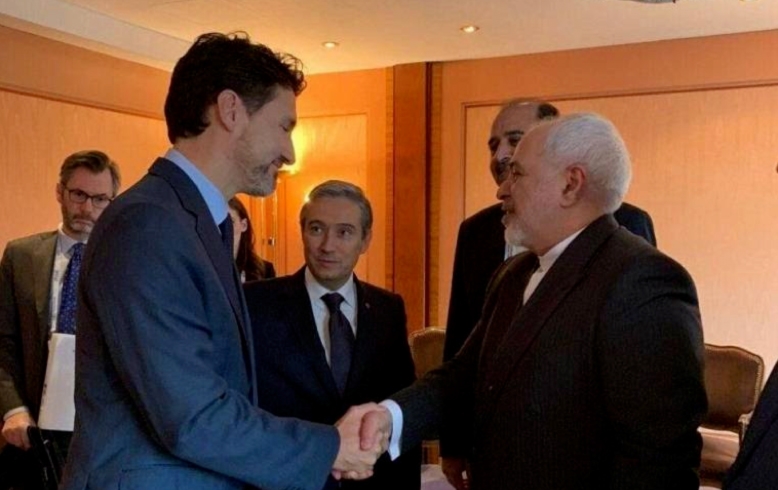
B’nai Brith Canada launches lawsuit against federal government
ABOVE: Prime Minister Justin Trudeau shakes hands in a recent meeting with Iran's Foreign Affairs Minister, Mohammad Javad Zarif (Global)
OTTAWA – B'nai Brith Canada has filed a lawsuit against the federal government, citing its failure to comply with a motion to list Iran's Islamic Revolutionary Guard Corps (IRGC), in its entirety, as a terrorist organization.
The action, specifically launched against both the government and the Minister of Public Safety and Emergency Preparedness, comes about five weeks after B'nai Brith, the Council of Iranian Canadians and the Justice 88 Campaign publicly urged the implementation of a motion passed by the House of Commons in June of 2018.
"We made it clear last month that no further delays by the government would be accepted by Canadians," said Michael Mostyn, Chief Executive Officer of B'nai Brith Canada. "Unfortunately, there is no alternative at this point to legal recourse. It is intolerable that 20 months have elapsed since this important motion passed, and no action has been taken by our government to implement it.
"The IRGC poses a very serious security threat to Canadians. Listing it as a terrorist entity in this country is necessary to deter this threat and reduce its ability to do harm."
The lawsuit, B'nai Brith Senior Legal Counsel David Matas explained, asks the Court to respond to the request B'nai Brith has made to list the IRGC as a terrorist entity.
The IRGC was responsible for last month's downing of a civilian airplane in Tehran, killing 57 Canadians and another 81 people who were travelling to Canada.
It is tasked with protecting Iran's brutal Islamist dictatorship and supporting its international terrorist proxies. Its principle objective is to fuel and fund terrorism. It suppresses Iran's own people and is a serious public security threat throughout the Middle East and around the world.
The IRGC has been responsible for sponsoring, orchestrating and carrying out many deadly terror attacks on foreign soil, from the bombing of the AMIA Jewish community centre in Argentina to the killing of hundreds of U.S. service people and civilians in Iraq, to the recent siege of the U.S. embassy in Baghdad, to conducting terrorist plots in Germany, just to name a few.
In Toronto and other major cities around the world, the IRGC supports the disturbing al-Quds Day hatefests that demonize Israel and incite hatred toward Jews. Earlier this week, B'nai Brith drew attention to the use of a "We Are Jew-Killers" slogan at an IRGC-backed rally in Tehran.
So what does it mean to be listed as a terrorist group in Canada?
Groups listed as terrorists in Canada are forbidden from legally operating in the country. In addition, a listing forbids Canadians from supporting or funding the terrorist group. As of now, it is fully legal for any Canadian to provide funds to brutal and dangerous terrorist groups if they are not listed. That is why listing the IRGC is necessary.
The House of Commons motion in June of 2018 was sponsored by Sherwood Park-Fort Saskatchewan MP Garnett Genuis, who asked the government to "immediately" list the IRGC as a terrorist entity. All Conservative and Liberal MPs in attendance voted in favour.
The United States formally listed the IRGC as a terrorist group in April of 2019. Canada previously listed the Quds Force, the IRGC's external operations branch, but not the umbrella organization.
"Today," Mostyn said, "the Islamist regime is undoubtedly seeking to avenge the killing of its IRGC General (Qasem Soleimani, killed by a U.S. air strike Jan. 3). Canadians are more at risk than ever by the IRGC. Our safety concerns are pragmatic, moral and urgent.
"The government must act immediately — and our lawsuit aims to ensure this immediate action."












